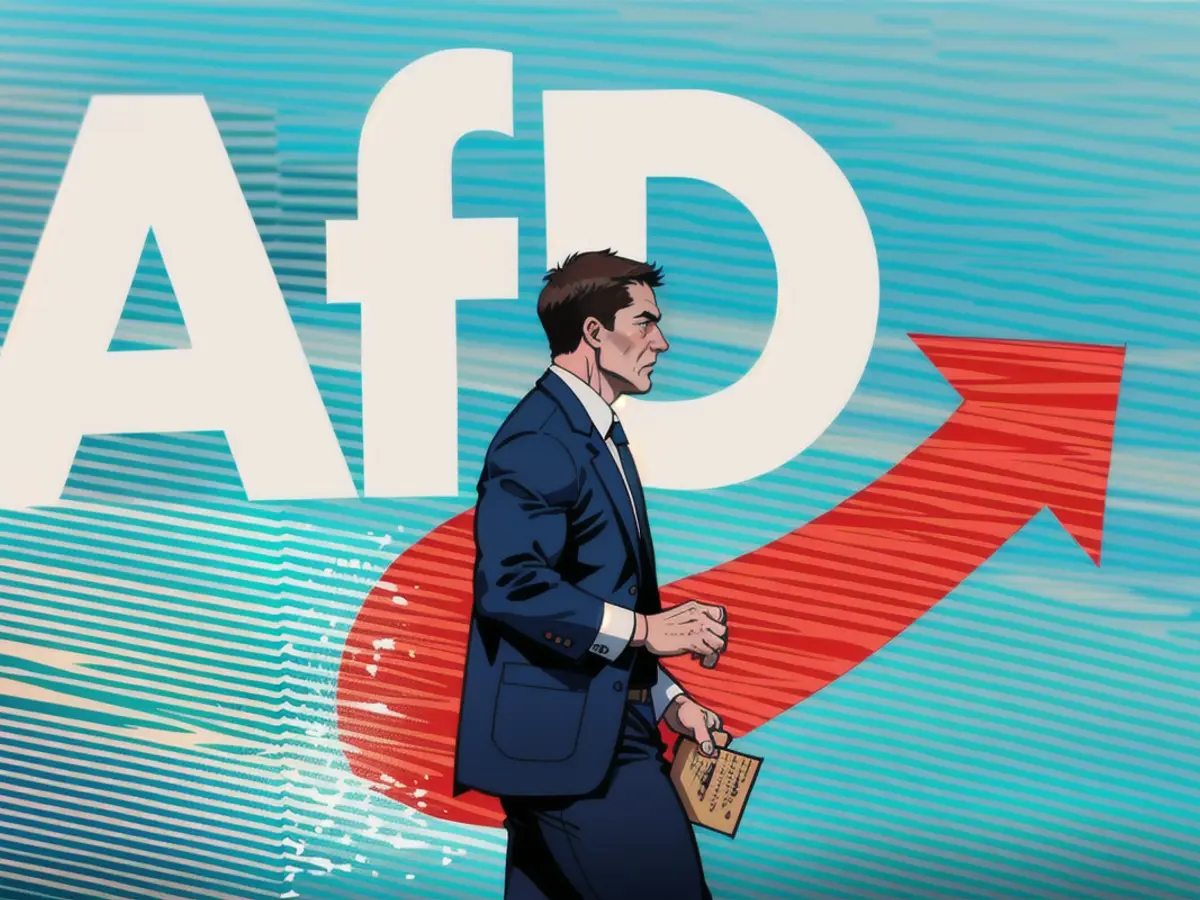Is the AfD's blue tide affecting Thuringia?
Before the upcoming state and European elections, Thuringia will hold elections for mayors, district councils, and municipal parliaments. This upcoming vote is essential, as the AfD, led by Björn Höcke, could gain considerable influence, while the CDU might lose its dominant position. The outcome of these elections could significantly affect the CDU politician Mario Voigt's attempts to replace incumbent Minister President Bodo Ramelow from the Left.
Municipal elections in a federal state usually do not attract national attention, but in Thuringia, this local super election day holds more meaning. The results of the ballot aren't just about the future of individual cities and towns. Will the AfD's previous electoral losses, which were quite prominent during the winter, also reflect in the outcomes in Thuringia? Can the CDU maintain its position as Thuringia's communal powerhouse and send a signal for the state elections slated for September 1st? Voigt, the CDU's top candidate, has planned to replace Ramelow from the Left. Or will the complex political landscape of the region continue to lead Thuringia to government inefficiency?
Around 1.7 million people have been requested to vote on Sunday. In the five free cities of Erfurt, Jena, Gera, Suhl, and Weimar, along with the town of Eisenach, the mayors will be elected. In 93 cities and municipalities, the mayors will be chosen, with 70 of these positions being full-time. District councils will also be elected, and in most cities, districts, and municipalities, the city, district, and municipal councils.
On Sunday, the district presidents will also be voted for in 13 of the 17 districts. In 2019's elections, AfD politician Robert Sesselmann won his first district president post for the party in the Sonneberg district. More potential victories could follow. This is a significant development, given that Höcke, the right-wing extremist, currently leads the AfD in this state.
Which party will enter the state election campaign as the "winning party"?
According to Erfurt political scientist, André Brodocz, these local elections primarily serve as a poll gauge. The election results may either boost or dampen parties' morale. This aspect isn't insignificant compared to the state election taking place three months later. "Winning parties are more appealing to many voters than losing ones." Additionally, if the AfD manages to garner a substantial increase in votes compared to the municipal elections of 2018 and 2019 in Thuringia, they can argue that people trusted them "even in the most remote corners of Thuringia."
Predicting an outcome is risky due to the varying regional conditions, issues, and candidates' personalities. Besides the AfD, the SPD, Left, FDP, and non-partisan candidates also hold potential for mayoral and district president positions. After winning the first district president post for the party in the Thuringian Sonneberg, the AfD faced defeats in the districts of Nordhausen and Saale-Orla. These races saw non-partisan and CDU candidates prevail with the help of other democratic groups.
The conviction of AfD right-wingers Höcke for using a Nazi slogan may not affect voting decisions for or against the AfD, claims Brodocz. Recently, the AfD seemingly reinforced a party loyalty among some of its voters. "A portion of the AfD voters appears to be immune to such scandals." In surveys for the state election, the AfD has barely lost ground over the past few months and currently stands at 30%, CDU at 20%, and the Left at 16%.
The CDU regards the upcoming municipal elections as critical. In 2018, the CDU was once more the strongest party, earning around half of all district councils and a 37.9% vote share during the district councils' and mayors of free cities' elections. Unlike the CDU, some of the party's senior members, like those in the Catholic-dominated Thuringian Eichsfeld area, are retiring due to age. "The CDU needs a good local result for the state election," stresses Brodocz.
At the start of the year, CDU member Christian Herrgott showed that "we can beat the so-called Alternative." Voigt is relying on the strong emotional attachment most Thuringians have to their homeland. "We are the only party that has put forward candidates in all districts for the municipal elections," explains Voigt.
While the AfD doesn't nominate candidates in all areas, the CDU has double the number of candidates for the district council elections. The Left, SPD, and Greens also have more candidates than the AfD. In the Saalfeld-Rudolstadt district, the AfD's candidate list has sparked a rift. There are now two competing lists, with the local CDU and the AfD themselves planning possible legal challenges to the election.
The event captivated the nation's attention, with local AfD members demanding Höcke's resignation. The candidacy of a right-wing extremist for the district administrator role in Hildburghausen, southern Thuringia, stirred up tension. Although the local election committee had approved the candidate, he is well-known as a key figure in Thuringia's extreme right-wing movement. It's anticipated that some elections won't be settled on Sunday. Afterward, the European election will occur on June 9th.
Read also:
- Year of climate records: extreme is the new normal
- Precautionary arrests show Islamist terror threat
- UN vote urges Israel to ceasefire
- SPD rules out budget resolution before the end of the year
- The 'Pioneering' attempts of the AfD, under the leadership of Björn Höcke, to gain significant influence in Thuringia's local elections could potentially disrupt the 'Shaft' of power held by the CDU.
- Critical analyses suggest that the outcome of these 'Local elections' in Thuringia could play a decisive role in determining whether the AfD, with its 'Sloshes' of support, will enter the state election campaign as the "winning party."
- The 'Thuringia' elections, being a precursor to the state and European elections, serve as a 'Pioneering' ground for parties to gauge their popularity, with the winning parties often having an increased appeal amongst voters.
Source: www.ntv.de








